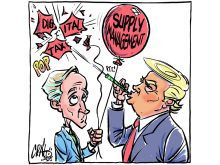IT IS time to take the campaign to reopen Canada’s beef trade to a new, more forceful level.
On the diplomatic front, prime minister Jean Chrétien must take a more decisive personal role in convincing the United States, Japan and our other trading partners that they have nothing to fear from Canadian beef.
And the diplomatic action must be backed up with every legal recourse available through trade agreements.
The science is on Canada’s side. When the single case of bovine spongiform encephalopathy was identified May 20, government agencies responded immediately and with vigour. The exhaustive investigation that ensued found no more infected animals.
Read Also

Agriculture needs to prepare for government spending cuts
As government makes necessary cuts to spending, what can be reduced or restructured in the budgets for agriculture?
An international panel that reviewed Canada’s response congratulated animal health officials for their speedy, comprehensive investigation. The panel’s recommendations to make the system even safer are being implemented. United States secretary of agriculture Ann Veneman also congratulated the effort and has said Canadian beef is safe.
Why does the border remain closed?
It is because the Americans are, so far, accommodating the unscientific demands of Japan to guarantee American beef shipments are free of Canadian product.
The guarantee can’t be given because of the integration of the North American cattle industry and the lack of a cattle traceability system in the U.S. To preserve its Japanese market, the U.S. is blocking Canadian imports.
If this impasse is not broken soon, Canada will have to contemplate a cull of its beef herd, a devastating and costly move that must be avoided.
Chrétien must lead a Team Canada mission to Japan to answer all that country’s questions and forcefully press it to accept Canada’s beef. Chrétien must also press Washington to act with consistency in support of science-based, rules-based international trade.
Canada has fully backed the U.S. effort to convince the European Union to accept the scientific evidence that genetically modified food is safe.
It is time for the U.S. to support Canada’s scientific evidence that its beef is safe.
Accepting Canadian beef might threaten U.S. sales to Japan, but to deny Canada this support would expose a shameful hypocrisy in American trade policy.
Also, as wheat board minister Ralph Goodale has noted, it would send a message to livestock producers around the world that they cannot count on science or fairness so they should not report animal disease and adopt a triple S approach: shoot, shovel and shut up.
If these efforts do not produce quick results, Canada should use its legal rights under the North American Free Trade Agreement and the World Trade Agreement.
America cannot be allowed to break its trade agreement with Canada simply because of threats from the Japanese market.
















